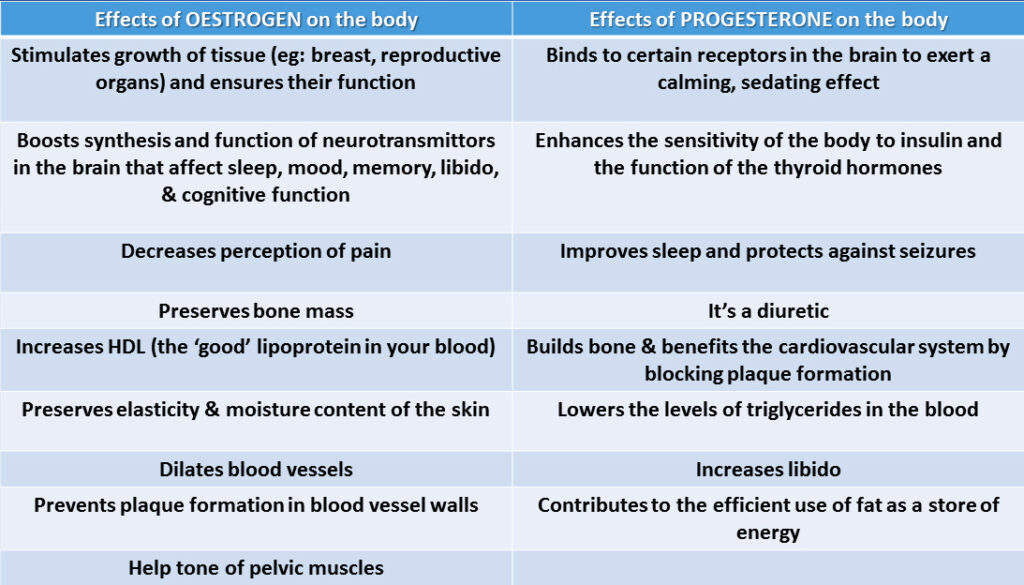Strictly speaking, the term ‘menopause’ describes the precise time of cessation of menstruation. However, it’s the term commonly used by most of us to describe the time in life, usually between the ages of 45 to 55 years of age, when the menstrual cycle begins to wind down and other attendant symptoms usually rear their head. In all, the process can take about 10 years. It’s much like puberty in reverse, and probably about as much fun!
The cause of the onset of menopause are the ageing ovaries. Gradually, the ovaries become less and less responsive to the pituitary hormones. This means that more and more of the menstrual cycles fail to lead to ovulation, and the production of oestrogen drops. The level of progesterone also decreases as a consequence of there being no ‘corpeus luteum’ present (see October’s article ‘Demystifying Menstruation’). The rate of drop in hormone levels varies significantly between women, and this may account for the fact that some women experience more profound symptoms than others. Studies indicate that approximately 25% of women are fortunate enough to go through the menopause asymptomatic (ie; have no symptoms), 35% have mild to moderate symptoms, while a further 25% have severe symptoms.
And the symptoms are pretty extensive. When one looks at the roles that oestrogen and progesterone play in the female body then it’s really no wonder

Hot flushes, tiredness, decreased cognitive function, anxiety, depression, mood swings, low libido, sleep disturbance, weight gain, joint pain, urinary problems (stress incontinence and UTI’s), prolapse and osteoporosis, all or some are possible during this time. Obviously, these physiological and psychological symptoms can, and do, have a severe impact on many women.
Fortunately, there are things that help. Most are centred round keeping our hormones in balance and managing symptoms. Nutritionally, intake of sugar, alcohol, caffeine, refined carbohydrates and processed foods needs to be limited, while intake of whole fruits, vegetables, whole grains, oily fish and water needs to be increased. This keeps your calorific intake in check as your metabolism slows down, thus preventing weight gain. A clean and healthy diet also supports the adrenal glands, which make oestrogen and progesterone, and so are extremely important. Increase calcium intake to prevent oesteoporosis, adding things like kale and tinned salmon (with the bones) to your diet. Avoid dairy! While it’s a good source of calcium it is also Damp-forming and therefore taxes the digestive system causing everything to slow down and get ‘stuck’. Chinese Medicine categorises all food energetically, so foods can be Heating, Cooling, Damp-forming etc. It is important to eat the foods that are best for you energetically and this can be determined by any good acupuncturist. Exercise! Exercising stimulates the body, not only on a physical level, but also a psychological level. Incorporating practices like Yoga or Pilates also gives one that space to connect with oneself and destress, much needed during this transitionary period. Supporting yourself psychologically is paramount as this is often the area that women struggle with most. And, of course, there’s acupuncture and Chinese Herbs that can be prescribed to alleviate symptoms and allow an easy transition. I find a combination of both works really well so this is the approach I take with my patients.
The Chinese see menopause as a journey, one that transforms a woman from a time of reproduction and motherhood to a time of wisdom and creativity. In a culture where youth and sexuality are lauded perhaps we should take a leaf out of the Chinese’s book and embrace the change.

Strictly speaking, the term ‘menopause’ describes the precise time of cessation of menstruation. However, it’s the term commonly used by most of us to describe the time in life, usually between the ages of 45 to 55 years of age, when the menstrual cycle begins to wind down and other attendant symptoms usually rear their […]


